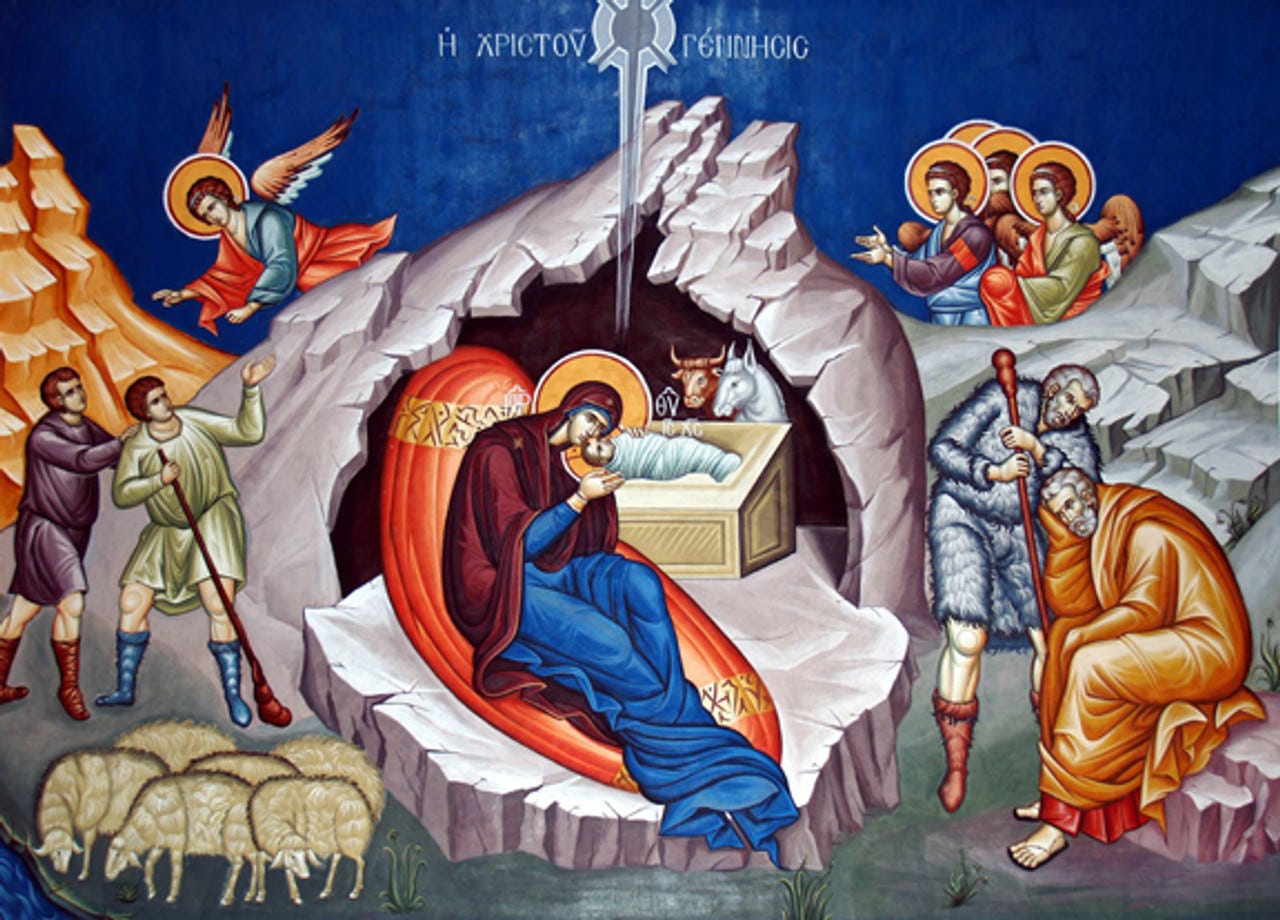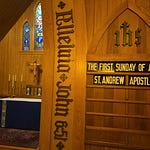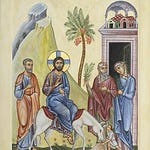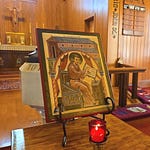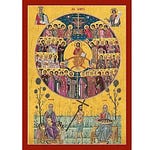To acknowledge and celebrate in our Divine Liturgy the birth of time of the Mediator between God the Father and human beings, the man Jesus Christ, born of woman, born of Mary under the Law, we are now drawn to reflect upon the words of the blessed evangelist John concerning the eternity of the Word, that is, concerning the eternity of Christ’s divinity, in which He remained always equal to the Father. As a privilege, I think, of John’s singular focus on Christ, S. John grasped the hidden mysteries of Christ’s divinity at a more profound level and, thanks be to God, he was able to disclose these hidden mysteries to others. For it was not mentioned without reason that at the Last Supper John leaned upon the breast of the Jesus, for through this we are taught in figurative language that John drank the draught of heavenly wisdom from the most holy font of Jesus’s breast, and did so in a more outstanding way that the other evangelists.
Hence, in the symbolic representation of the four animals, John is rightly matched with the flying eagle. The eagle, indeed, is said to fly higher than all other birds, and is said to direct its sight toward the rays of the sun more piercingly than all other living things. The other evangelists (Ss Matthew, Mark, and Luke), as though they were walking with the Lord on the earth, explained brilliantly Christ’s emergence in time, along with His deeds in time; but they said relatively little concerning His divinity. John, however, as though he were flying to heaven with the Lord, expounded relatively few things concerning Christ’s acts in time, but recognized the eternal power of Christ’s divinity, through which all things come into being, and he handed this on in writing for us to learn. Whereas the other evangelists bear witness that Christ was born in time, John bears witness that this same Christ was in the beginning, saying, “In the beginning was the Word.” The others record His sudden appearance among human beings; John declares that He was always with God, saying, “and the Word was with God.” The others confirm that He is a true human being; John confirms that He is true God, saying, “and the Word was God.” And the others testify to the wonders which Christ did as a human being; John teaches that God the Father made every creature, visible and invisible, through Christ, saying, “All things were made through Him, and without Him nothing was made.”
And to a remarkable extent blessed John, at this the beginning of his Gospel account, properly imbues us with the faith of orthodox belief concerning the divinity of the Savior, even anticipating false doctrine taught in the later centuries of the Church. For example, false doctrine taught by the 4th century priest Arius (called the Arianism heresy), who said, “If Christ was born, there was a time when He did not exist.” John refutes this beforehand with his first utterance when he says, “In the beginning was the Word.” He does not say, In the beginning the Word began to be, because he wrote in order to point out that Christ’s coming into being was not from time, but that He existed at the emergence of time, and so that through this wording he might point out that Christ was born of the Father without any beginning in time.
In the same way there was the 3rd century priest and theologian named Sabellius (with the heretical doctrine called Sabellianism or “modalism”), which denied that the Holy Trinity is three Persons, and said, “The same God is Father when He wants to be, Son when He wants to be, Holy Spirit when He wants to be; nevertheless, He Himself is one,” that is, one Person and not three. Rebuking this error, John says, “And the Word was with God.” For if the One was with the Other, unquestionably the Father and the Son are two, and not one as if He Himself were sometimes the Father, and sometimes the Son, and sometimes the Holy Ghost. And likewise against other heretics did John speak and, by the grace of God, condemn.
In a profound way, the evangelist describes Christ’s two natures, namely the divine nature (in which He always and everywhere remains complete) and the human nature (by means of which He appeared to be contained by place when He was born in time), saying He was in the world, and the world was made through Him, yet the world knew Him not. He came into His own home, and His own people received Him not. (The evangelist says “the world” to mean human beings deceived by love of the world, and by being attached to creatures have turned away from acknowledging the majesty of their Creator.) Indeed, Christ was in the world and the world was made through Him because He was God, because He was complete everywhere, because by the presence of His majesty He ruled without labor, and without burden He held together what He had made. He came into His own because when He was born He appeared through His humanity in the world which He had made through His divinity. He came to His own home because Christ deigned to become incarnate in the nation of Judaea, which He had united to Himself beyond other countries by a special grace. He was in the world and He came into the world. He was in the world through His divinity; He came into the world through His nativity.
Dear brothers and sisters, we who today recall in yearly devotion this glorious human nativity of our Redeemer, must always embrace His divine nature as well as His human nature with a love that is not yearly, but continual – we must continually embrace His divine nature, through which we were created when we did not exist, and His human nature, through which we were recreated when we were lost. And so, for this reason, the Word became flesh, that is, the Word became bread, that is, became Sacrament and dwelt among us, so that by keeping company with us in His human being become bread become Sacrament, He would be able to unite with us; by speaking to us He would be able to instruct us and present to us a way of living; by dying He would be able to struggle for us against the enemy; by rising He would be able to destroy our death – and so that through a divinity coeternal with the Father’s, He might raise us to divine things by bringing us back to life interiorly through the Sacrament, that in feeding us with Himself He might grant us forgiveness of sins and at the same time the gifts of the Holy Spirit, and that through the seven Sacraments He might not only lead us to see the glory of His glorified and sacramental humanity, but also show us the unchangeable essence of His divine majesty, in which He lives and reigns with the Father in the unity of the Holy Spirit, ever one God, world without end. Amen.
(Adapted from the Gospel Homily I.viii by the Venerable Saint Bede)


